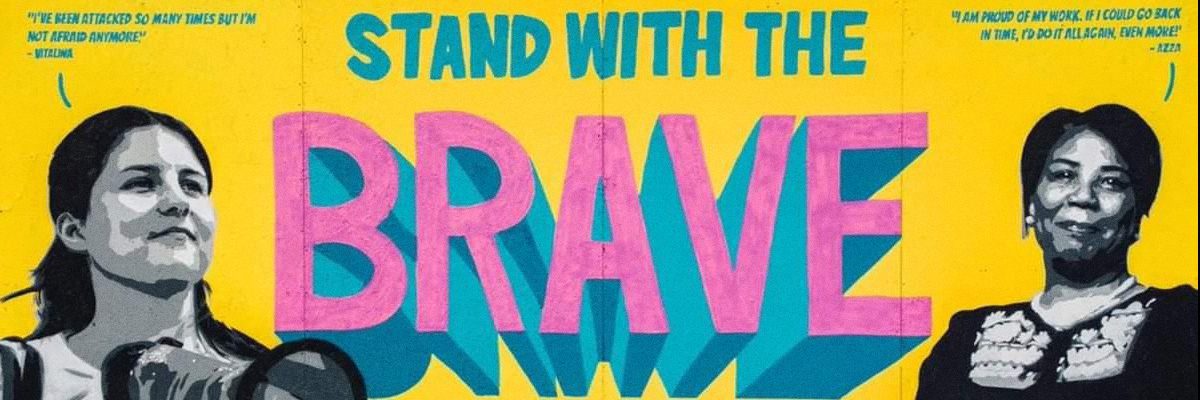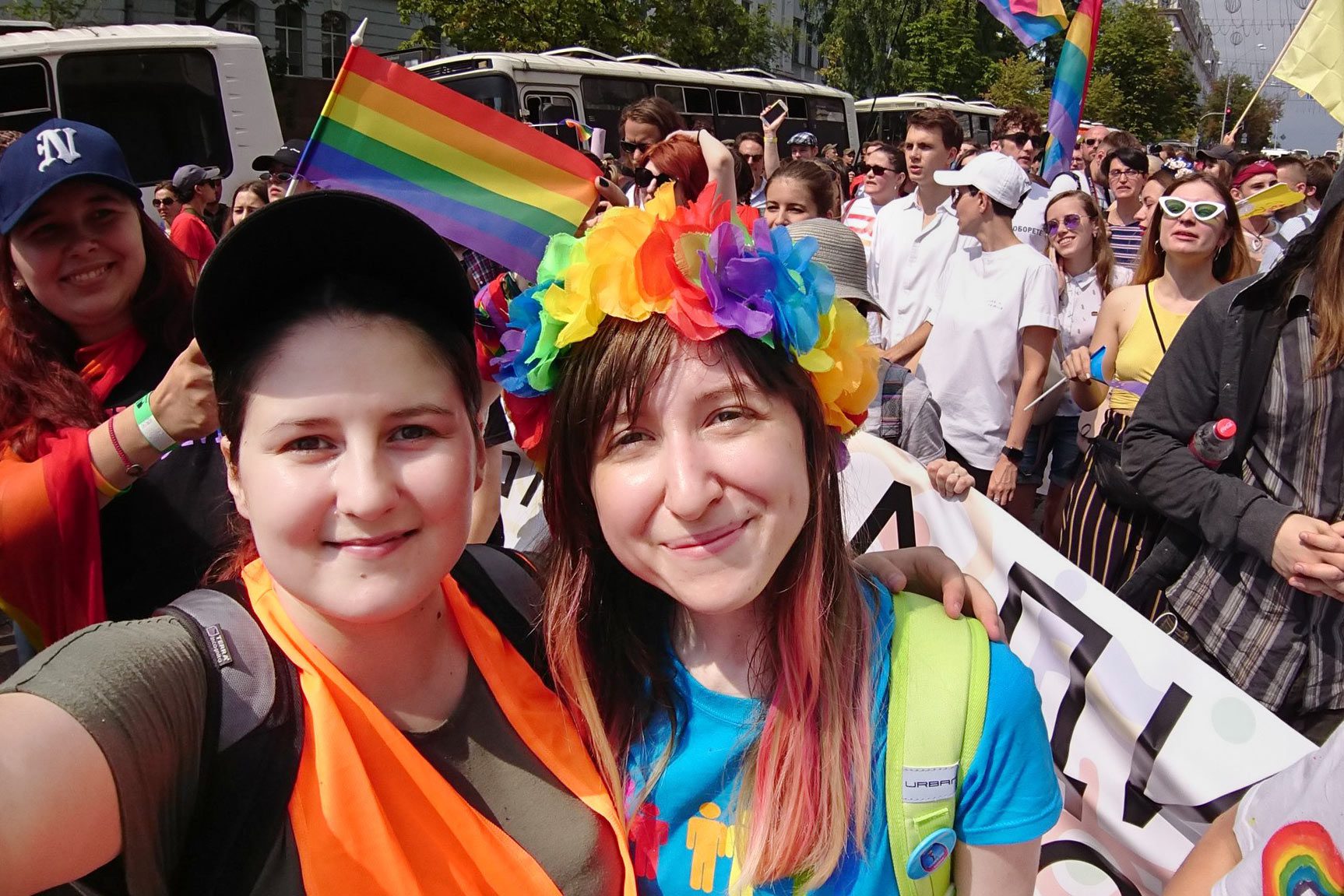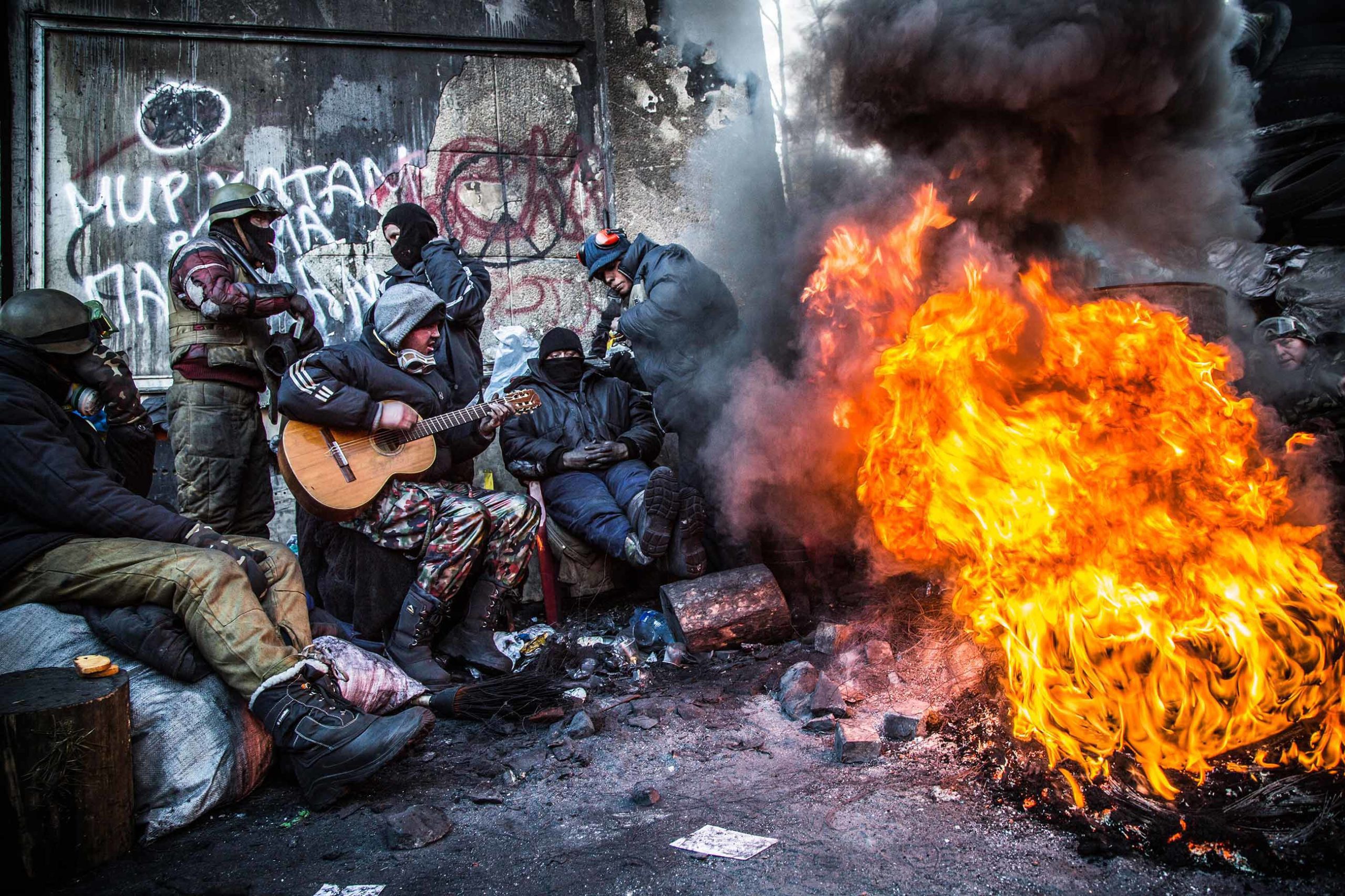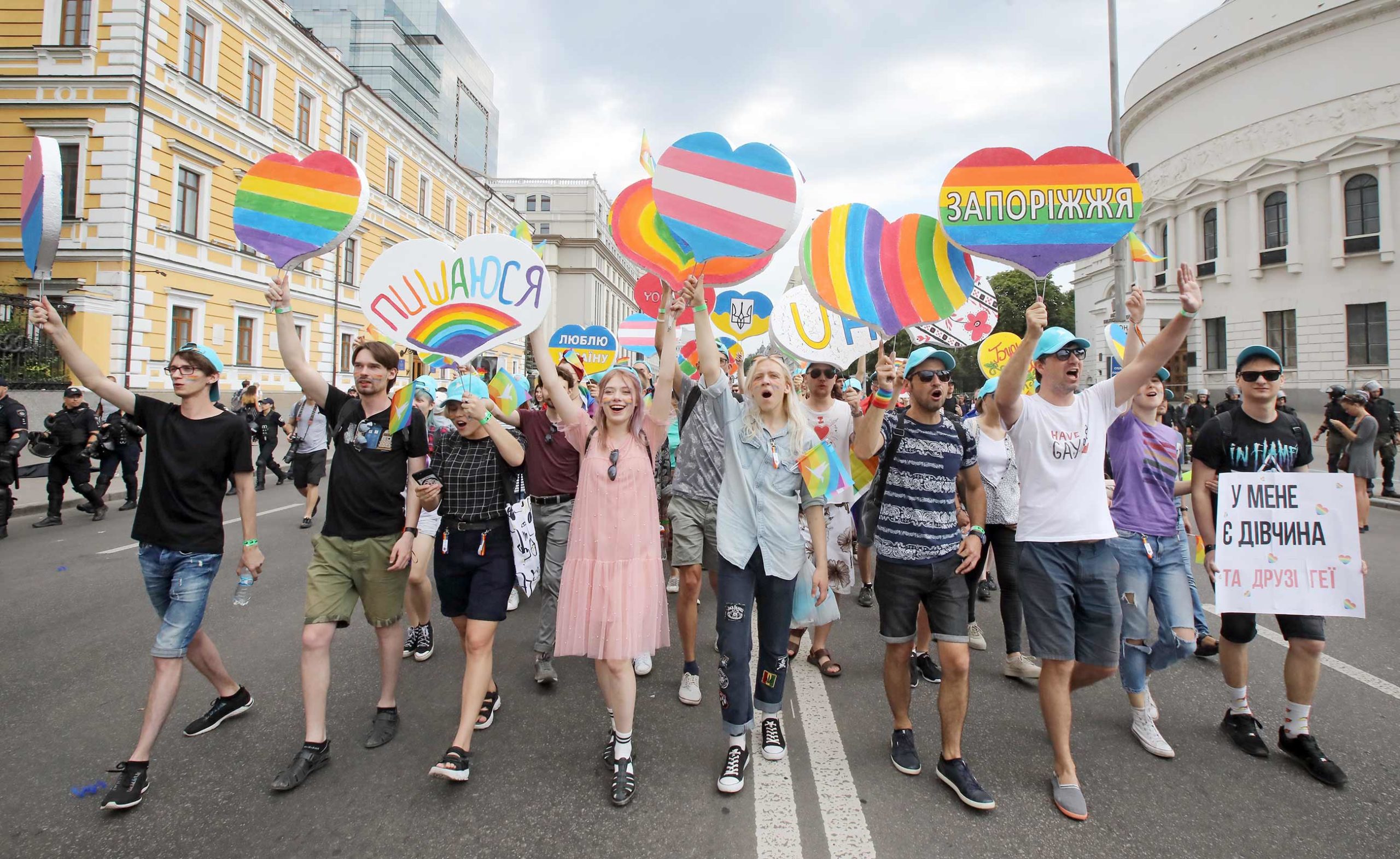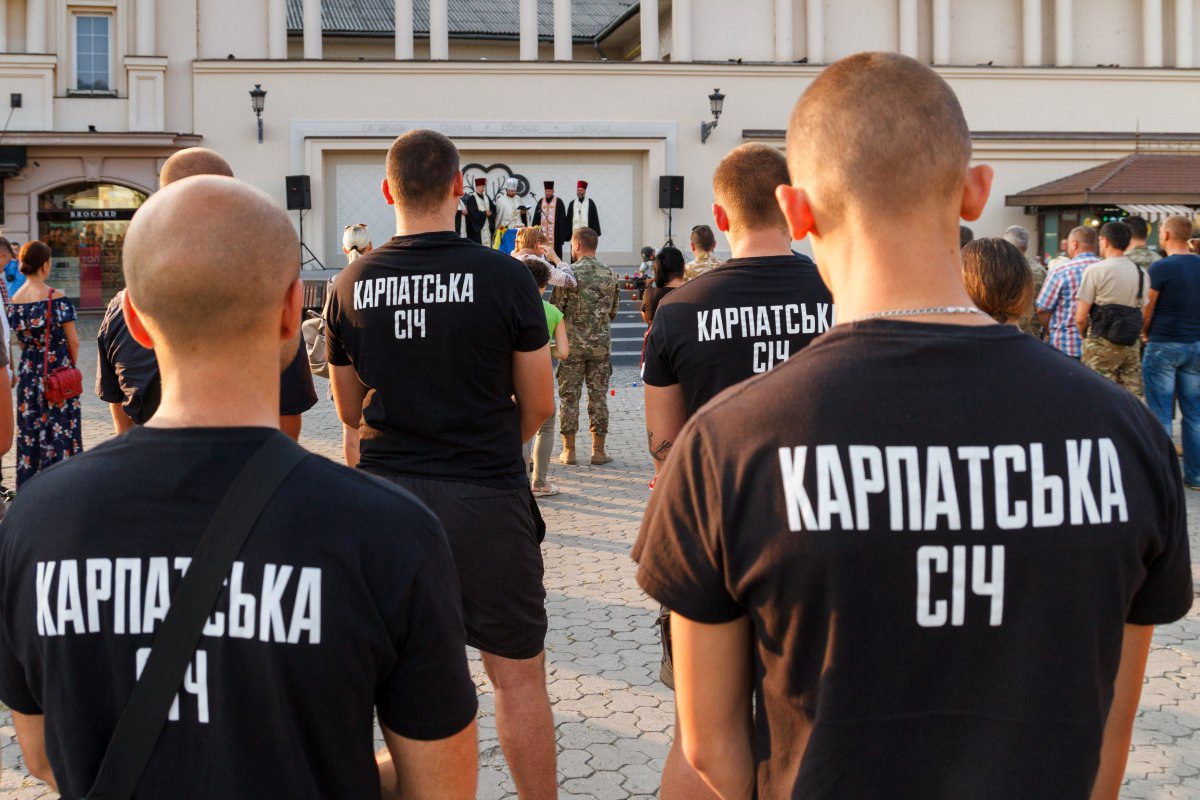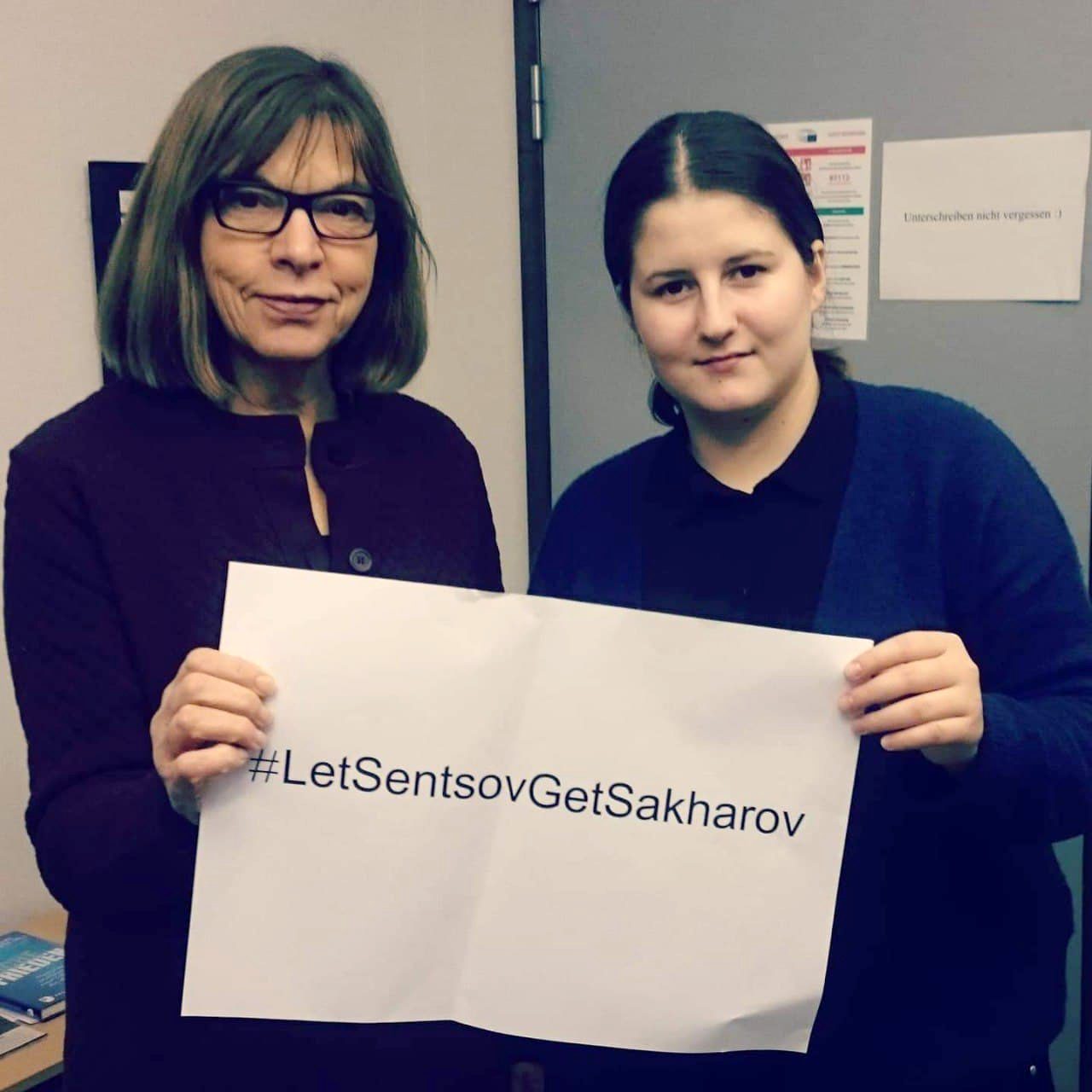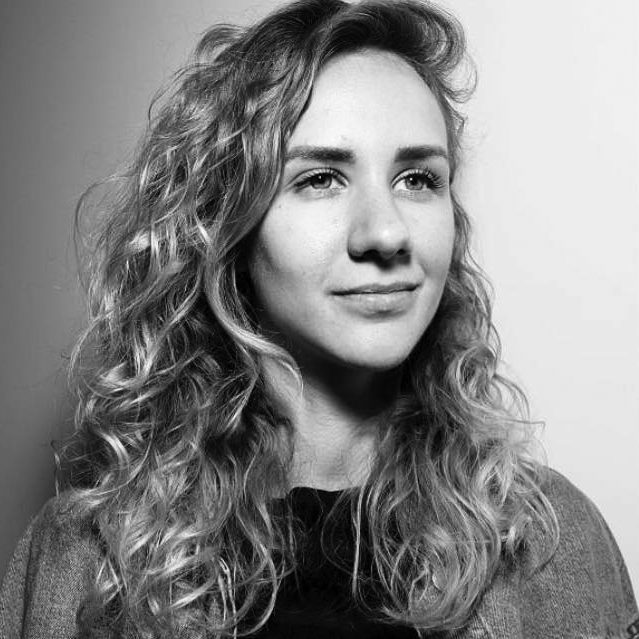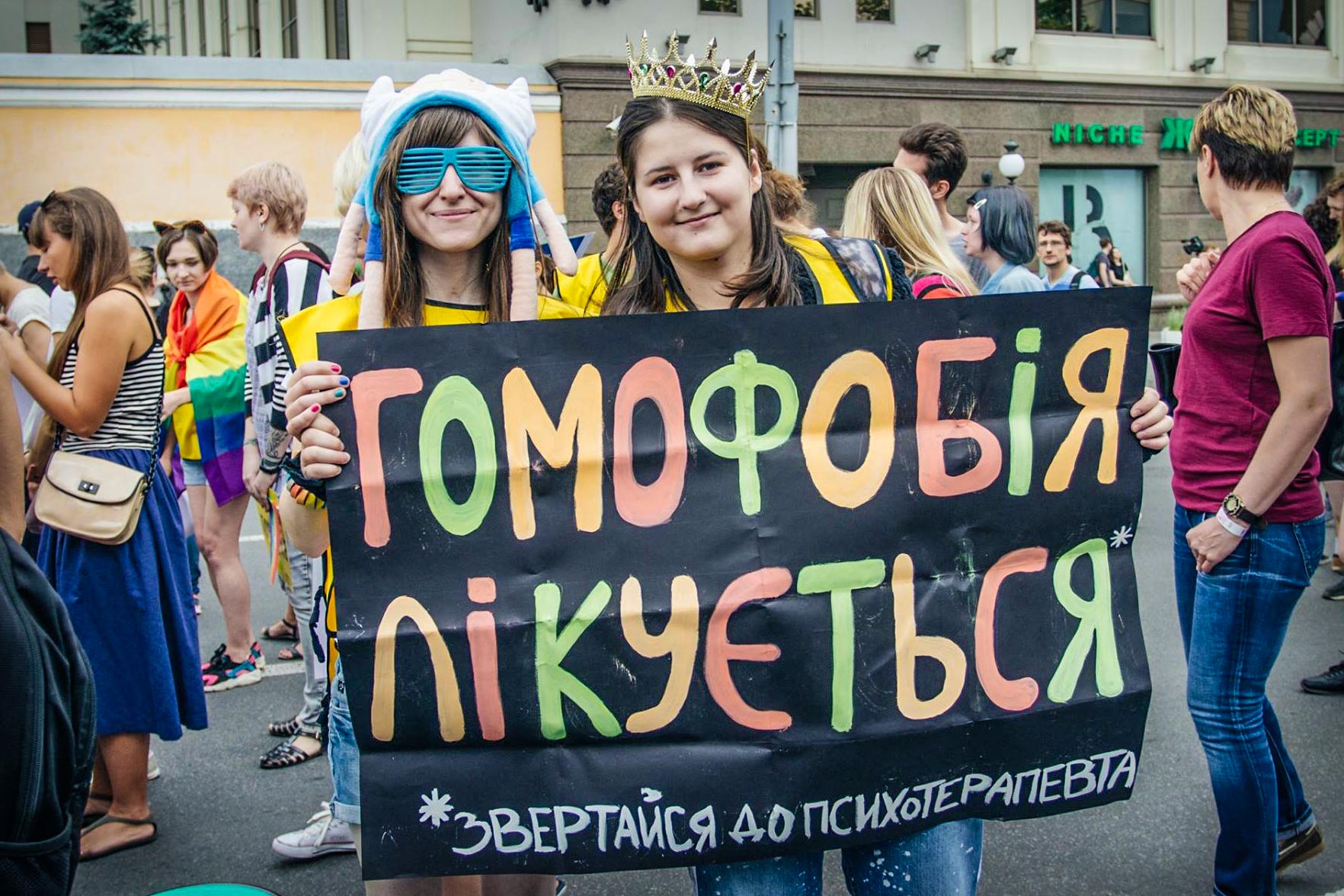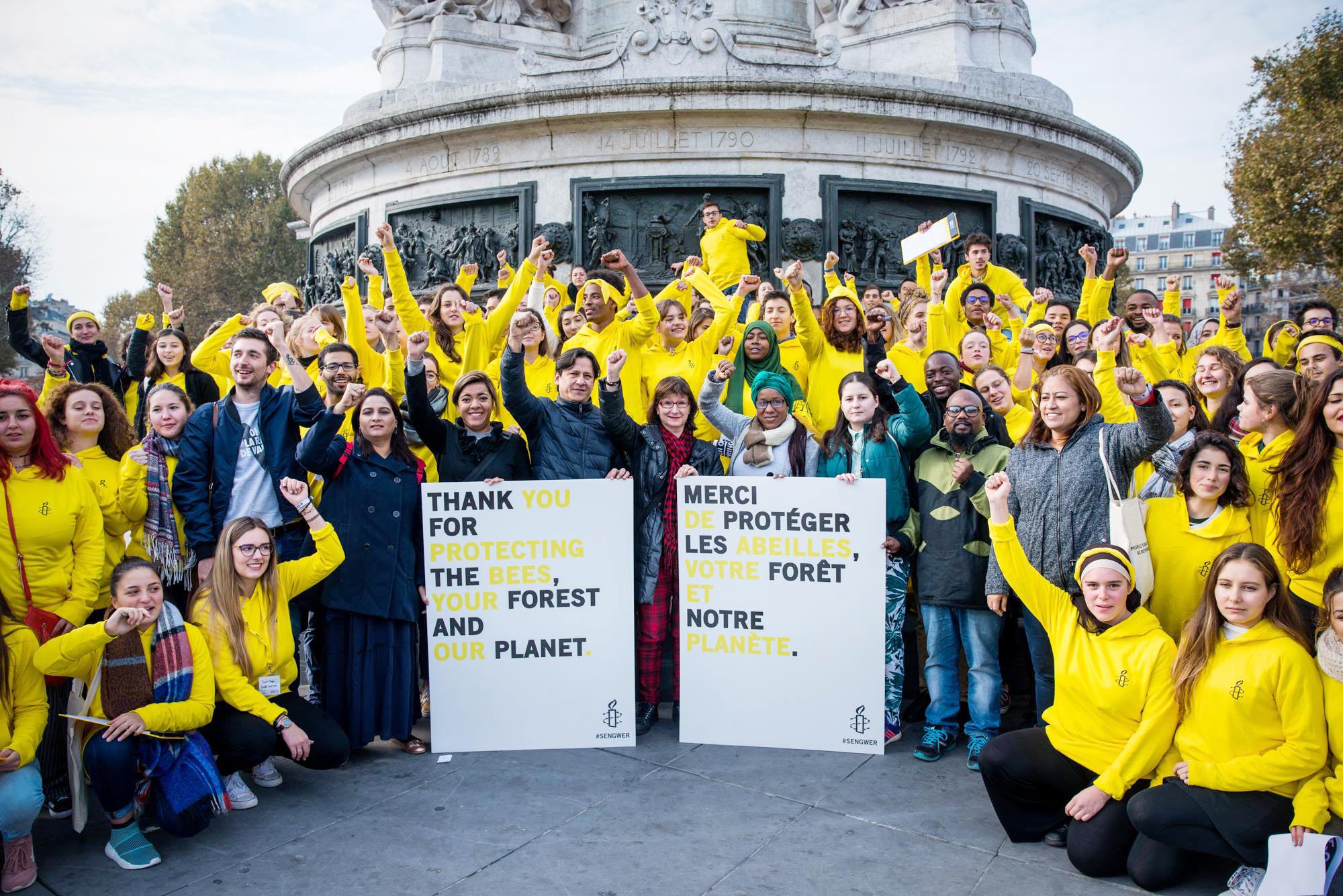In 2018 in Uzhhorod, a city in western Ukraine, several far-right radicals attacked a feminist rally. The participants were splattered with paint and homophobic pamphlets were thrown. The case was investigated, but later various things began to happen. At first, law enforcement officers simply released the attackers and then divided the case into two parts and sent them to court. The court hearing was delayed as long as possible and eventually part one was closed due to the expiration of investigations. The case moved on to the second part. However, this case became known all over the world, with Uzhhorod police receiving letters from all over the world demanding they investigate the attack. Zaborona’s Polina Vernyhor spoke to LGBT + and feminist activist, organizer of the same action, and victim of that day, Vitalina Koval.
Coming out
Vitalina, 31, was born in Uzhhorod. She remembers that as a child, she liked to talk to both girls and boys. As a teenager, she enjoyed spending time with her girlfriends, but later she began to think about relationships.
Vitalina recalls a memory from her past: “I had a pretty strong attitude in my head that you need to date guys. I had a relationship with guys, but at the age of 15 I realized that I was frigid: I didn’t feel anything for them. The first kiss was awkward. We were standing in the entryway then, I was looking at the ceiling, and I was thinking “Is this happening like that?”.
Everything changed when Vitalina first kissed her girlfriend: the feelings were completely different. But at that time Vitalina had homophobic beliefs – she thought that if she liked girls, then something was wrong with her. Therefore, for some time, Vitalina could not accept that she is a lesbian and even enrolled in a university with a major in psychology to better understand what is wrong with her.
At the age of 17, Vitalina first confessed to her grandmother. But she reacted very sharply: she shouted at her granddaughter, manipulated her, and threatened to evict her from the apartment where her whole family lived at the time. Then Vitalina had to lie that it was just an experience and in fact, she “likes boys”. In a few years, Vitalina tried again to confess to her parents – her mother said that if it was true, she would kill herself.

Photo: Віталіна Коваль / Facebook
“It was quite an emotional and long process. We quarreled for about half a day. But I realized that now I am not ready for the possible consequences. That’s why I started a fake relationship with my boyfriends when they came to our house to meet with my parents. But I was torn up inside because in my family, I was always taught to tell the truth and be honest, but now I had to lie, ” Vitalina recalls.
On Vitalina Koval’s 25th birthday, she decided to finally admit to her parents that she was a lesbian. She was going home that day, thinking that she had no strength left to hide her identity. In the evening, Vitalina gathered her parents and told them about everything: about her kisses with boys and girls, about fictitious relationships, about how difficult it is for her to hide all of this. It was a difficult conversation, and everyone was crying. But Vitalina seemed to be heard for the first time. In the morning, the parents asked not to talk about it now, because it is very difficult information for them. For a while, the Koval family pretended that there was no conversation.
A year later after Vitalina had already moved out, communication between her and her family became warmer. Her parents said they loved her despite everything. And when Vitalina first commented for one of the local channels and made a public coming-out, her mother called her and said that she was infinitely proud of her and loves everything that Vitalina does. Vitalina became the first open lesbian in Uzhhorod.
Activism
Vitalina remembers when it all started at Kyiv’s Maidan Square in 2013. Vitalina went twice with friends to help the protesters – in December and January. Before the first time, the company discussed a lot of events in the country and went to rallies in Uzhhorod.
“You either turn on or not at a turning point like this. It was important for me to get involved, because I thought that I love Ukraine and I would like us to have a normal government, and laws and law enforcement agencies that do not violate human rights. I felt: When would I voice my position, if not now?” – says Vitalina.
When Koval and company first went to protest in Kyiv, they were hosted by Amnesty International Ukraine. That’s when she became acquainted with different activists and tried to volunteer on the Maidan. When her group had left for the second time, the situation on the Maidan had already worsened. It was scary, but since then something changed in Vitalina’s life, she could no longer stay away from human rights violations.

Photo: Vianney Le Caer/Pacific Press/LightRocket via Getty Images
Before the Maidan and the war in eastern Ukraine, Vitalina worked as an event organizer and as a copywriter. She mostly worked in the Russian market – there were more gigs, and they paid better. However, after the Euromaidan, she realized that she could no longer work with Russia: it contradicted her values.
Soon a friend approached Vitalina and said that the LGBT organization GAU was coming to Uzhhorod and wanted to open a community center called “Queer Home” there. Vitalina was invited to a meeting with this organization. There, Vitalina was directly asked if she could coordinate the center. At that time, Vitalina felt burned out at her old job, and was ready to go public and defend the rights of others, so she became an activist and headed the Uzhhorod branch of Queer Home.
“At some point I realized that one person can change something around herself. Before that, I thought that all these actions meant nothing at all. I understood that I was “ready” for activism. There were many acquaintances around who were facing the same problems as I had before. They were either not accepted by their families or they were afraid to open up to others. It seemed unfair, but I realized that it wasn’t that there was something wrong with these people, but with a toxic society that was not ready to accept diversity. People simply suffer because of what society is like. It seemed to me that I could change that, ”says Vitalina.

Photo: TARASOV / Barcroft Media via Getty Images
The first conflict with the far-right
The organization headed by Vitalina had two vectors: public and non-public. The non-public direction involved internal meetings, trainings, etc. The public one meant participating in rallies. These were not open LGBT rallies, as the city was simply not ready for them, but rather human rights events.
At one point, members of the Feminist Workshop (Lviv) came to Uzhhorod to record a podcast with the activists there. In Uzhhorod, “Feminist Workshop” had gained Vitalina’s interest. While recording the podcast, Vitalini was asked about feminist activities in the city. She thought that no one deals with this topic.
“There is a saying: ‘If you can’t fly then run, if you can’t run then walk, if you can’t walk then crawl, but whatever you do you have to keep moving forward.’ I then assessed our activities as ‘pointing’ in the direction of feminism. Namely we seem to support feminist ideas, but we do not hold any public actions, ”says Vitalina.
After this conversation, Vitalina had the idea to hold a feminist event in honor of International Women’s Day. On March 8, 2017, several activists from Queer Home and the local INSIGHT branch went to one of the central squares of Uzhhorod with posters. Police were warned about the rally, but none of the police officers arrived on the scene. But about 25 members of the far- right organization Carpathian Sich came. They pushed and insulted the protesters and took away their posters. The confrontation lasted about 40 minutes. Later, two law enforcement officers arrived on the scene and tried to talk to the attackers, but the participants continued to attack the girls. The activists later wrote a statement to the police about this fact and asked why a case was never opened.

Photo: Nemesh Yanosh / UNIAN
Decisive attack
On March 8, 2018, another rally was held in Uzhhorod. This time the participants were better prepared, but still insisted that law enforcement officers be present. But the attackers also prepared: they took sexist and homophobic flyers and stocked up on paint. At the end of the rally, six members of the far-right organization Carpathian Sich attacked Vitalina and other activists – they doused the girls with paint and threw their flyers at them. As a result of the attack, Vitalina received eye burns, another participant suffered from the same, and other girls suffered damage to their clothes and hair.
Police then detained the attackers, but only two girls were charged with “inflicting light bodily injuries.” One of them was 17 years old, the other a little older. Four more members of Carpathian Sich were let go, while the organization stated that those four were not among the attackers at all and literally hung the entire attack on the two youngest members. Vitalina says that when the attackers were detained, police did not seize their smartphones, which may have had evidence of their guilt. They were spoken to and released – then the four did not appear in any way in the case.
After the attack, Vitalina received a phone call from Amnesty International Ukraine, and she was offered legal support. She agreed. The victims of the attack received legal instructions from those lawyers, and later a lawyer, who is still defending Vitalina in this case, joined in.

Photo provided by Vitalina Koval
An investigation was opened under the article on violation of equality of citizens and bullying. Soon it was divided into two parts – one was left with a qualification of violation of equality, the second was reclassified as minor injuries. As a result, the case was sent to court, but defense attorneys began writing statements for leave or dismissal before the hearings. In this way, the trial was deliberately delayed, and the judge eventually acquitted the defendants, stating that the statute of limitations had expired. Human rights activists from Amnesty International Ukraine believe that this decision violates the right of Vitalina Koval to a fair trial, as she was essentially deprived of justice.
“This was a legal decision – this situation occurred due to numerous delays which indicate a systemic crisis in the work of law enforcement agencies, and poor motivation to solve hate crimes and bring the perpetrators to justice. This approach deprives victims of the right to a fair trial and leaves them without justice and compensation,” said Kateryna Mitieva, a spokeswoman for Amnesty International in Ukraine.

Kateryna Mitieva
However, the second part of the case is still open. Vitalina’s lawyer has repeatedly written requests for the case to be properly investigated. While the investigation has been stretching on for over two years, investigators have not yet examined homophobic flyers and ink-covered items.
“Although the motives and the attackers are obvious, for some reason this case is difficult for investigators. They can’t see the motive of hate and violation of equality,” says Vitalina.
Amnesty International Ukraine says that since the investigation began in November 2018, the statute of limitations set by the Criminal Procedure Code of Ukraine should expire soon. Because of this, human rights activists are worried that the case will be closed.

Photo: Віталіна Коваль / Facebook
“At least it is necessary to extend the statute of limitations of the investigation, which will be an indicator of the interest of law enforcement agencies in not merging the case. If this does not happen, Vitalina Koval’s right to equal access to justice will be violated. Currently, the investigation has been slowed down at the stage of conducting the necessary examinations,” noted Mitieva.
If the case is closed, however, Vitalina plans to appeal the decision to the International Court of Human Rights.
“This case is very important. I am not fighting for compensation or for the punishment of the attackers but for the recognition of the motive of hate. For any decision, lawyers have a strategy. This case in itself can be used to advocate for the anti-discrimination Bill No5488. The adoption of this law will not affect us in any way but it can stop systemic attacks on activists,” Vitalina explains.
In the first half of 2021, the Human Rights Center ZMINA recorded 53 cases of harassment of activists. In 2019, human rights activists counted 83 cases of harassment of activists. In 2020, 101 such cases were recorded. On the other hand, cases of harassment or attacks on activists in Ukraine are not investigated – they are usually deliberately delayed, as was the case with Vitalina or even closed for lack of corpus delicti.
Life after the attack
Vitalina admits that while there have been negative consequences to this situation, there have also been good ones. On the bad side, Vitalina is still treating her eyes. The disease has entered a chronic phase and she is forced to periodically visit a doctor and take medication.
At the same time, Vitalina’s address was leaked to the public right-wing radicals, so she had to leave Uzhhorod because she did not feel safe. In general, the attack significantly affected Vitalina’s emotional state – she’s working it all out in therapy.
As a result, Vitalina moved to Kyiv and became the heroine of two international campaigns held by Amnesty International Ukraine – one a letter-writing marathon, and the other – Brave, demonstrations in support of brave women from different countries. As part of the latter, an Irish artist painted a mural depicting Vitalina and Egyptian human rights activist Azza Soliman, known in her country for her fight against sexual violence against women, on one of the walls of Stradbally. Vitalina became the first international case of advocacy of the Ukrainian branch of Amnesty.
“It was an experience that completely changed my life. In two years, I visited many European countries where I met with diplomats and human rights activists. I learned a lot about public speaking and advocacy and saw how to work on reforms and apply this experience in Ukraine. But the most I was affected by were real letters from people around the world. These letters still sit in my house, and I sometimes reread them and feel such a powerful sense of unity. This experience gave me some extra strength and motivation that I can talk about for hours because it changed me,” Vitalina says.

Photo: Віталіна Коваль / Facebook
Now in Uzhhorod for two years in a row, feminist demonstration have taken place that are safe and even supported by the City Council. Vitalina says that after the attack, the safety of activists and the demonstrations themselves became a regional agenda.
“I took the publicity and the kick. I am the person targeted by the far right. This means that other people who are not public feel safer,” she commented.
Vitalina Koval now works as a consultant for an international program related to reforms in Ukraine. Her activity is not public, and Vitalina says she likes it.

